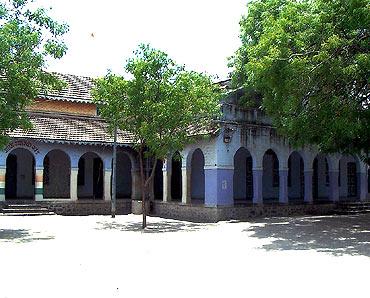
As we approach M K Gandhi's birth anniversary on Sunday, one of his cherished institutions in his home state of Gujarat has fallen victim to greed.
In 21st century India, it seems, the lust for land has not even spared the Mahatma.
Kinner Aacharya reports.
There has been no bigger failure in India in the last 64 years than the degeneration of Gandhian institutions -- national, educational and social -- which were founded to inculcate the value systems that the Mahatma had envisaged.
The Rashtriya Shala in Rajkot, Gujarat, has fallen prey to greed, the apathy of local politicians and the Gujarat government's indifference.
It was founded by Mohandas Karamchand Gandhi with the generous help of Lakhajiraj, then the ruler of the state of Rajkot, who provided 66,000 square yards of land.
Gandhi's childhood was spent in Rajkot, he studied in a primary school here, and many memorable incidents of his early life took place in this city. But that history, it appears, has been buried with a vengeance in one of Gandhi's favourite towns.
Gandhian institutions in Rajkot are under the scanner for their far-from-Gandhian activities. As we approach Gandhi Jayanti on October 2, it may be worthwhile to ponder what we have made of his legacy.
...
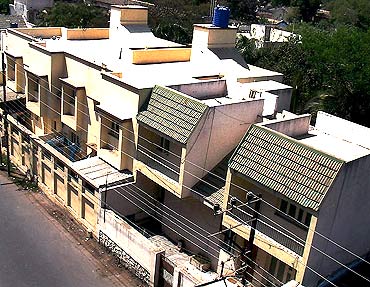
The Rashtriya Shala, founded by Gandhiji and managed by a trust, is an example of how quickly the Mahatma's ideals have been forgotten.
The Shala opened in 1924 to impart 'National Education based on Gandhian concepts.' Post Independence, the Shala declared its aim to impart basic education based on Gandhian ideology and to run various constructive activities as propounded and advocated by the Mahatma, based on Sarvodaya ideals.
How its trustees reconcile these aims with the several shops, an architecture college, private hospitals, a beauty parlour, grocery stores and palatial houses on the campus is something that not even court orders have been able to reveal.
The Rashtriya Shala is located on approximately 67,000 sq yards of land in the centre of Rajkot, prime property which is as valuable as Churchgate in south Mumbai or Golf Links in New Delhi.
At the prevailing market rate, it is worth at least Rs 1,000 crore or Rs 10 billion!
Around 30,000 sq yards of land has been rented out at low rates or has been encroached upon.
One case in court, related to Rashtriya Shala land, revealed that Vitthal Aahya, who currently heads the institution, and his brother Pravin Aahya have constructed bungalows here, registered in the name of their family members.
Vitthal Aahya's niece and Pravin Aahya's daughter have set up an interior designing college.
Jeetu Bhatt, a tenant of the trust, has established Sarvoday Sankul, but few know what it does. He obtained land on rent from the Rashtriya Shala and allegedly sub-let a part of it at a high rent plus a deposit of Rs 200,000.
Under the rules, he was supposed to deposit the Rs 200,000 with the trust, but he has not done so.
Devendra Desai, who headed the trust for almost a decade, uses around 1,000 sq yards of land for his own institution, the Saurashtra Rachnatmak Samiti.
A trustee, Somaji Solanki, has a house on the campus while another trustee, Himat Goda, and his son have built homes for themselves on the property which is supposed to nurture Gandhian values.
A college operates in the name of Meenaben Kundaliya, whose father is one of the biggest businessmen in Saurashtra. The land was given on rent, reportedly at throwaway prices, to the daughter of a man who has enough money to buy land in any part of the country at market rates.
...

Ready-made garment shops thrive on Rashtriya Shala property, half-a-dozen private clinics and hospitals operate on its land as does a nursery school and private educational institutions that collect substantial fees.
There is everything here, it seems, except Gandhi.
The Rashtriya Shala campus also has a housing society with 140 properties and 80 tenants. Some houses were originally allotted as living quarters by the trust to its workers, but the second and third generations of these families have stayed on and do business on the property.
Bhimji Rathod, an ancestor of Chandu Rathod and Chinu Rathod who lives here, used to work at the Khadi Bhandar here. The Rathod family today runs Bachpan Play House, which has replaced a dairy, that was once run by the trust.
Some properties are illegal encroachments, but others have been rented out for such paltry amounts that the Rashtriya Shala trust loses millions of rupees each month.
Pravin Aahya pays just Rs 175 a month as rent for his splendid bungalow. Pushpaben Aahya pays Rs 40 every month. Somajibhai pays Rs 75 and Chandu and Chinu Rathod pay Rs 150 each as rent to the trust every month! Jeetu Bhatt pays Rs 940 every month and Meeraben Aahya pays Rs 4,000 for the huge building of her college.
Then there are the commercially run hospitals. Dr Amit Hapani runs a fairly huge hospital here for which he pays a rental of Rs 4,400. Dr Amit Gandhi pays a monthly rental of Rs 2,115. The Rotary Club has established a magnificent building for which it pays a rent of Rs 5,860.
Nobody is ready to reveal the purpose behind giving land to such institutions.
Efforts have been made by aware citizens and a few honest government officials to remove the encroachments, but there is no response from the trustees.
Vitthal Aahya, who heads the Rashtriya Shala, is 92 years old and in indifferent health. His brother Pravin Aahya is in America; he reportedly faces inquiries for his involvement in other Gandhian institutions.
Devendra Desai, who managed the institution for many years, does not find anything wrong at the Rashtriya Shala.
"It is not appropriate to consider tenants as encroachers," says Desai. "Approval for most of the properties was obtained at various levels. All these decisions were taken during the tenure of the previous trust. I am only a trustee now."
During his tenure Desai says he followed the Rent Act.
...
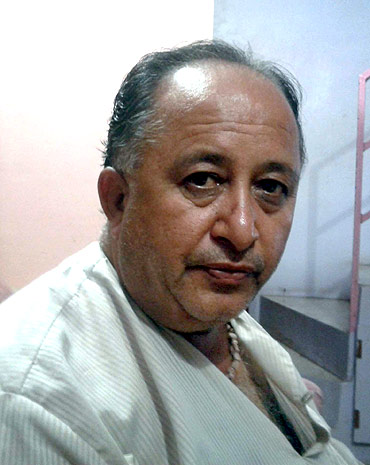
Bharat Tanna, who is employed at an engineering firm, is fighting almost single-handedly the Rashtriya Shala trust's practices. He says the residences allotted by the trust to employees are considered as quarters only.
"It is clearly stated in the charity commissioner's verdict of March 3, 2010 that if an employee retires or if he dies, the residential quarter must be handed back to the institution. If this is not done, then the institution can obtain possession very easily through the law," he says.
But, he adds, "the trustees are not interested in getting back the property as they may run the risk of being trapped. Several trustees are holding onto land illegally."
Tanna's litigation resulted in as many as six court verdicts against the Rashtriya Shala in the last five years. The charity commissioner, the revenue tribunal, the Gujarat high court and various courts have ruled against the trust, but the trustees have taken no action.
Seven years ago when the trustees tried to sell 5,000 square yards of land, Tanna took the case to the charity commissioner's office and asked that the sale be stopped.
Charity Commissioner J I Antaani ruled that the sale be stopped. His observations reveal the trustees's intentions:
'This institution has been registered in context of Gandhiji's thoughts and values,' the charity commissioner ruled.
'Is there any necessity to sell out the property in such circumstances? The trustees of the trust have indirectly declared that the financial condition was responsible for the sale of the disputed property. But the trustees have failed to clarify what care they have taken if the financial condition of the institution was ruined,' the charity commissioner added.
'It is not feasible to accept that there was no alternative left except selling the property. It is not acceptable that the trustees of the trust have to trade directly or indirectly to sell out the property,' concluded the charity commissioner.
All the rulings -- from the charity commissioner to the Gujarat high court - based their verdicts on the agreement between the Rashtriya Shala and Rajkot's then ruler Lakhajiraj, or Thakor Saheb as he was known, who donated the land to Gandhiji.
It is clearly mentioned by Lakhajiraj in the original agreement that 'No land should be sold or given on rent. But if this land is sold out on behalf of the state for the betterment of the school, then prior approval of Thakor Saheb should be acquired.'
With the end of royal authority, it was the district collector who took decisions. The courts and other institutions also ruled that approval must be obtained from the state government and collector for the sale of any land that belongs to Gandhian institutions.
...
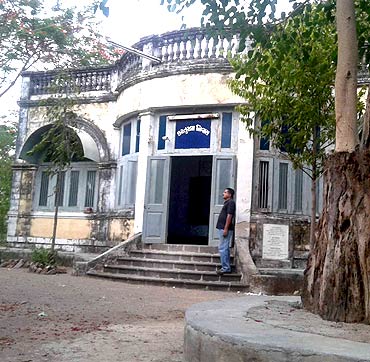
After the charity commissioner's adverse verdict, the Rashtriya Shala trust approached the Gujarat revenue tribunal.
On March 6, 2006, the Gujarat revenue tribunal declared: 'This land has been given to the institution by the late rulers and with a right to sell at net price or at very low rate thereafter. But there is a constraint in this agreement that it cannot be sold without the approval of Thakor Saheb. Moreover, there is a condition that it can be sold out with prior approval only for a school utility or its betterment purpose.'
'After the independence of India,' the tribunal noted, 'it is necessary for the trust to take approval from the state government instead of Thakor Saheb.'
This huge property was donated by Rajkot's then ruler to Gandhiji for welfare and educational activities. In 1920, after initiating the non-cooperation movement, Gandhiji established the Gujarat Vidyapith as well as the Rashtriya Shala to bring about improvements in the education field, villages and khadi industries.
Ironically, in 1935, Gandhiji went on a fast at the Rashtriya Shala against the harassment caused by Rajkot's rulers!
The institution was registered under the Bombay Trust Act 1950 in which the trust's objectives were mentioned.
The trust's objectives were:
How ingeniously that definition has been twisted!
One trustee's daughter started a beauty parlour on the Rashtriya Shala campus recently. Former chief trustee Devendra Desai justifies this, saying, "The definition of universal welfare is very widespread"!
For argument's sake, if the trust made money by the illegal sale of land, have the trustees ploughed back the money to run the institution any better?
The answer is in the negative. The campus is in poor shape. The Khadi Bhandar is almost on the verge of shutting down. There is a sesame oil mill-producing machine on the campus which barely works.
Mansukh Joshi, a trustee and former Congress minister, says: "The condition of the campus is very unpleasant. It is essential that the institution emerges from the controversy quickly. It is disheartening when any institution associated with Gandhiji undergoes disputes."
..
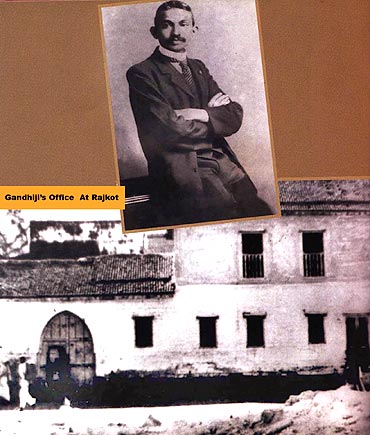
In May 2010, the charity commissioner filed a case before Rajkot's principal judge to appoint a receiver for the property on the grounds that 'the defendants have yet mismanaged the trust's property, enjoyed personal financial advantage and have completely failed in maintaining the property of the trust. It is not at all beneficial to keep the management in their hands for a longer period.'
As if this admonition was not enough, on April 25, 2011, Rajkot's district collector passed orders against Vitthal Aahya, the Rashtriya Shala trust chief, and Ushakant Mankad for allegedly violating the trust deed.
The trust filed a writ petition against the collector's orders in the high court.
The charity commissioner had earlier raised the suspicion in his verdict that the trustees were intentionally hiding the historical agreement between the trust and Rajkot's then ruler.
It is clearly mentioned in the collector's verdict that 'Every approval gained by the institution becomes secondary once this written agreement is on the table.'
A member of the trust said, "Family members of the institution's trustees are using the property in the name of rent. This is misuse of their authority. The trustees are not the owners of the property. It is their prime duty to save and maintain the trust's property. It is an irregular activity to build shops with the purpose of giving them on rent for long years."
"The old employees argue that they have got the residences on rent forever," the trustee adds. "The amount of rent is very negligible. It is the prime duty of the trust to get the property vacated after the retirement of the employee."
As many as 106 people have been issued show cause notices. In the last six decades, most of the land has been indirectly rented out and the tenants have changed too.
Only one acre of land (4,058 square metres) lies unoccupied.
Under the Bombay Public Trust Act no 36, with the charity commissioner's approval, efforts have been made to sell this piece of land too in order to attain financial benefit.
Gujarat Chief Minister Narendra Modi has built a grand Mahatma temple near Gandhinagar costing Rs 125 crore (Rs 1.25 billion). But no one appears interested in maintaining a property that can be considered as a real Mahatma temple and honour the Mahatma's wishes.
Bharat Tanna feels a Mahatma temple, if it had to be built, should have been built at the Rashtriya Shala. Even if no temple is built, says Tanna, "at least liberate this once real temple of Gandhi's ideas from the clasp of corruption."